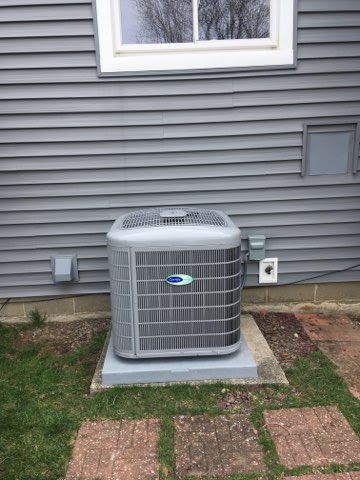Can I Recycle My Old AC Unit?

Recycling an old air conditioner is an important way to protect your local environment and comply with federal regulations for appliance disposal. According to the Environmental Protection Agency (EPA), Americans replace approximately 6 million AC units each year. While it is an important step in the right direction to want to recycle your AC unit, the process is not as simple as dumping your unit into the standard recycling bin. Instead, it is important to enlist professional help for proper AC unit disposal. Following the correct guidelines can help you handle the unit in a manner that is both safe and efficient.
Why Do I Need Professional Help to Recycle My Old AC Unit?
Some homeowners wonder why they cannot simply dump an AC unit into the recycling bin or leave it outside for trash pickup. One of the main reasons is that air conditioners contain refrigerant. The very oldest AC units contain a refrigerant known as chlorofluorocarbon (CFC). As a dangerous greenhouse gas, CFC leakage depletes the ozone layer and can contribute to global warming. The industry phased out the standard use of CFC in 1995, but any old AC unit from this era may still contain this substance.
During the early 2000s, AC manufacturers switched from CFC refrigerant to halogenated chlorofluorocarbons refrigerant. Common abbreviations for this refrigerant are HCFC-22 or R-22. Unfortunately, research soon showed that HCFC-22 is also a harmful chemical that can deplete the ozone layer. The industry began to phase out HCFC-22 or R-22 in 2010. Production of all AC units that use R-22 ended permanently in 2020. But since the average lifespan of an air conditioner is 15 years, millions of AC units currently operate using the R-22 refrigerant. For this reason, homeowners cannot simply tamper with refrigerant or dump their air conditioners in a landfill. Handling an old AC unit requires a professional.
Air conditioners manufactured after 2020 usually contain a refrigerant known as R-410A. While R-410A may be less hazardous than the older R-22 refrigerant, it is still a greenhouse gas. In fact, research has shown that the leakage of a single kilogram of R410a can have the same negative impact on the local environment as running your vehicle for six months straight. Many AC manufacturers have opted to phase out the use of R-410A as early as 2023.
In response to ozone depletion, global warming, and climate change, the U.S. government has made it illegal to dispose of an air conditioner without first removing its refrigerant. Due to the nature of this chemical, only trained professionals can ensure its full extract. Local governments can also impose fines if regulators determine that a homeowner has dumped this appliance improperly, so it is best to contact a trained technician whenever you decide to replace your unit.
What Steps Will an Expert Take to Recycle My Old AC Unit?
After properly extracting the refrigerant, a trained professional may also disassemble the unit. A technician can help you determine which AC components are recyclable and which require other forms of responsible disposal. For example, AC pipes, hoses, tubes, and tanks can contain hazardous chemicals. Your AC technician would need to remove these parts for separate transport to a hazardous waste recycling facility.
Recyclable AC components may include the following:
- Metal ducts
- Metal panels and doors
- Copper tubing
- Brass, steel, and other small metal parts
- Sheet metal casing
- AC motor
- AC compressors
- AC evaporator coils
- Original cardboard box or shipping container
AC components that may require other forms of disposal can include the following:
- Flexible ducts
- Fiberboard or fiberglass
- AC capacitors
- Tiny plastic components
Once your technician has disassembled the unit, you can determine the best way to recycle the non-hazardous parts. For example, the EPA operates the Responsible Appliance Disposal (RAD) program in partnership with 77 facilities nationwide. The RAD can help you safely recycle various parts of your AC unit. If your state does not have RAD facilities, ask your utility company about any bounty or rebate programs.
These programs offer a stipend, rebate, or discount to homeowners who recycle their old appliances in favor of newer models that comply with the EPA’s EnergyStar program. Similarly, some commercial retailers also offer to help recycle an old AC unit when you purchase a new one. You can check with an HVAC company for help with referrals. Finally, your municipal sanitation agency may also have designated days for appliance pickup or disposal.
Contact Us Today
As you can see, recycling your old AC unit requires the utmost care. Fortunately, trained HVAC experts can help you with all of the logistics. Vastola Heating & Cooling offers heating and cooling services for Erie County, Orchard Park, and surrounding areas. We help with old AC unit recycling as well as new installation or repairs. Contact Vastola Heating & Cooling for all of your AC needs.











